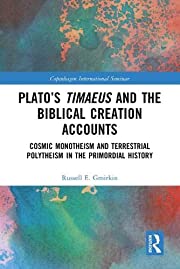 Bryn Mawr Classical Review has published a review by Nicholas Banner of Russell Gmirkin’s Plato’s Timaeus and the Biblical Creation Accounts in addition to giving space for Gmirkin to post a reply. Last year and early this year I posted a series on the same work: Plato and the Biblical Creation Accounts (Gmirkin).
Bryn Mawr Classical Review has published a review by Nicholas Banner of Russell Gmirkin’s Plato’s Timaeus and the Biblical Creation Accounts in addition to giving space for Gmirkin to post a reply. Last year and early this year I posted a series on the same work: Plato and the Biblical Creation Accounts (Gmirkin).
Banner’s judgment is summed up in his fourth paragraph:
It is worth emphasising both the welcome audacity of Gmirkin’s proposals and the inevitable limitations of any such work. Biblical textual criticism is an endlessly nuanced project, perforce based on numerous arguments from likelihood or probability, sometimes piled one on top of the other. We want to know how these texts came to be as they are, but our evidence refuses to let us know with anything like absolute certainty; that maximalist reconstructions are often put forward as established fact is indeed problematic. Gmirkin’s arguments are welcome in that they remind the reader of this, and remind us of the shakiness of the edifice upon which the accepted scholarly certainties of the eld are sometimes established. However, to this reviewer’s mind, Gmirkin’s take on his own Hellenistic composition hypothesis is itself rather too ‘maximalist’: much that is found in this book would be welcome as intriguing parallels suggesting the need for more research, but fails to convince as an open-and-shut case for widespread Platonic and other Greek borrowing in Genesis. While this is to some degree a question of unquantifiable scholarly judgement, this reviewer does not find the parallels cited by Gmirkin between Genesis and the Timaeus et al. compelling enough to warrant positing a dependency, even assuming a Hellenistic dating for the composition of Genesis. A few more detailed critiques follow as space allows.
Russell Gmirkin expresses his appreciation for an “eminently fair” and “high quality” review and addresses specific points made by Banner – in particular, the absence of Plato’s geocentric cosmology from Genesis, God “commanding things into existence” in the biblical creation narrative, and the following:
(4) Finally, let me address Banner’s criticism of my conclusion that the account of the pre-flood world and flood story drew on both the Atrahasis Story (by way of Berossus, as I argued in Gmirkin 2006) and “in part [on] a Jewish rewriting of the Atlantis myth in Timaeus and Critias (Chapter 7)!” Evidently Banner considered an exclamation point adequate, within the context of the review, to refute this argument. Obviously, it is impossible within the scape of a short review to drill down into the data, but such is actually required here. I note that the account of the pre-flood world in Genesis 6 and Plato’s Critias have these striking elements in common:
• Both have the [sons of the] gods dwelling among humans on earth and taking beautiful women to wife. Others (such as John Van Seters and Guy Darshan) have noted these common motifs in Genesis 6 and the earlier Hesiodic “Catalog of Women,” but none have noted the equally strong parallels in the later account by Plato due to prevailing assumptions about the antiquity of the Genesis account.
• Both portray the offspring of the gods as a mighty noble semi-divine race of heroes (“men of name” in Gen. 6:4). Both describe a subsequent degeneration or corruption of this goodly noble line (in Critias due to the dilution of the divine element through further intermarriages with humans) into a deplorable state of wickedness and violence.
• Both described the necessity of the gods (Zeus, Yahweh) to intervene by earthquake, rain and flood to destroy the wicked generation and give humanity a fresh start.
• Up until the time of Ovid, the only known stories of a flood sent to purge the world of immorality were found precisely in Plato’s Critias and in Genesis 6.
Banner apparently does not find such a cluster of parallels compelling, but I invite every reader to examine and evaluate the arguments for themselves, a sentiment I suspect Banner would agree with.
If you enjoyed this post, please consider donating to Vridar. Thanks!
